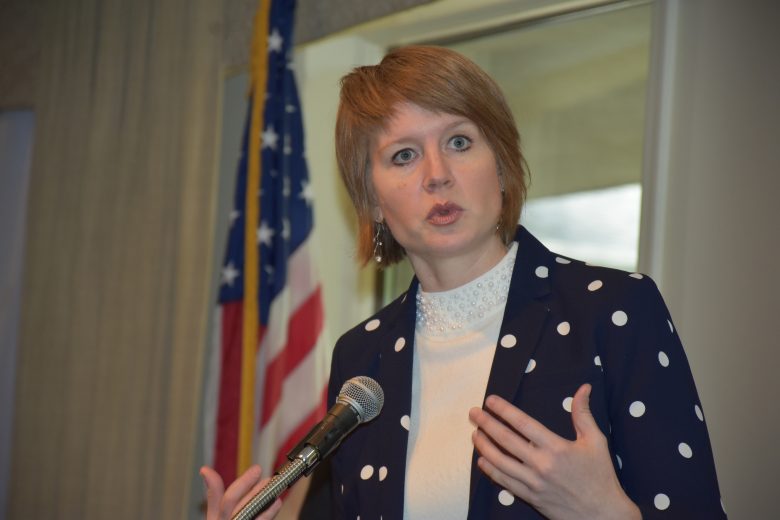
Novel Coronavirus (COVID-19)
Learn about novel coronavirus (COVID-19), our preparedness and updated policies to protect our community, patients, and staff. Learn more here.
Emergency
570-253-8141
Patient Room:
570-253-8609
When prompted enter 3-digit room number
Human Resources
570-253-8995
Wayne Memorial Hospital
601 Park Street
Honesdale, PA 18431
Click the map below for turn by turn directions.

(Honesdale, August 13, 2018) … “We have two goals for rural hospitals,” said Lauren Hughes, MD, MPH, MSc, FAAFP, “to achieve financial stability and keep the local community healthy.” Dr. Hughes, Deputy Secretary for Health Innovation for Pennsylvania, was outlining the Rural Health Model, a new hospital payment structure, to more than 120 people gathered for the annual SHIP (State Health Improvement Plan) breakfast on August 3 in Tafton. Wayne Memorial Hospital is the lead fiscal agent for the area’s SHIP partnership.
Dr. Hughes, who acknowledged a great appreciation for rural hospitals – “I was born in one in Iowa”— said the Rural Health Model calls for rural hospitals to continue their tradition of caring for the sick while renewing their focus on keeping the community healthy. The Rural Health Model, she explained, is designed to help hospitals prevent disease from occurring in the first place.
Eight rural hospitals in Pennsylvania, including Wayne Memorial Hospital, are in the running to participate in the program, also sometimes referred to as “global budgeting.”
The SHIP audience included representatives from social service agencies such as the Area Agencies on Aging in Wayne and Pike counties, school districts, community groups and elected officials, along with Wayne Memorial board and administration members.
Under the Rural Health Model, rural hospitals will be paid a fixed amount annually from multiple payers, including Medicare, Medicaid and private insurers. Instead of depending upon a fee-for-service income, which relies on an unpredictable volume of patients at any given time, hospitals will receive a steady stream of income. “Think of it like a salary,” said Dr. Hughes, “a predictable income that allows you to plan.” She said hospitals could use a portion of that stable income to fund health initiatives, such as vaccinations, or address issues like lack of transportation or create programs for patients with chronic obstructive pulmonary disease.
The Rural Health Model has been in the development phase for three years; it’s expected to launch January 1, 2019. If Wayne Memorial is among the first batch of participating rural hospitals, it can help develop and refine the new model of health care delivery.
“Hospitals can save money if we reduce our expenses,” said Wayne Memorial CEO David Hoff, who introduced Dr. Hughes, “which we can try to do with programs that essentially keep people out of our Emergency Department, which is costly, and out of our hospital.”
“The current system is broken,” said Jim Pettinato, RN, director of Patient Care Services at Wayne Memorial. “In our way of doing business now, a good run of bad health in our community helps our bottom line—and is that really good?”
Pettinato and Dr. Hughes answered questions about the Rural Health Model from the audience. Dr. Hughes noted that her department is also looking to form a Rural Health Redesign Center (RHRC) which would assist hospitals with further implementation of the Rural Health Model. A bill in the Pennsylvania State House to support the RHRC is now under consideration; one in the Senate is expected to be introduced soon by State Senator Lisa Baker (R ).
Their presentations were followed by talks from Jonathan Dunsinger, coordinator for the Wayne County Drug and Treatment Court; Jeff Zerechak, Wayne County Drug and Alcohol Commission; and Frederick Jackson, executive director of Wayne Memorial Community Health Centers.
Mr. Hoff ended the breakfast with a brief presentation on the hospital’s construction project. A new patient tower housing 50 private patient rooms is expected to open next spring.
The breakfast was organized by the hospitals’ Community Relations Department, headed up by Carol Kneier, RD, LDE with help from Jean Tuttle.
Photo: Lauren Hughes, MD, MPH, MSc, FAAFP presenting at the SHIP breakfast.